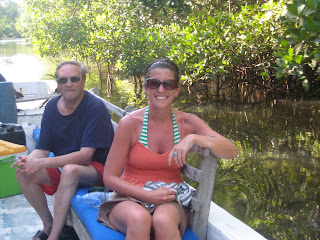Today we travelled an hour outside of Kaolack to the village of Dissiong. This was a most unusual experience to last year to see not only brick buildings, but also a generator in the village. Last year, the seven villages we visited were comprised of mud huts arranged in fractal geometric patterns, so this was a noted difference.
abenevolentmind
The beginning of the week was full of compromise. Two of our CTI bags had not arrived until a week later. Today, 11-11-11, however was different. While this village was eagerly awaiting our arrival like all the rest, the spark in the eyes of the members, presidents and council, when the technologies were brought out, had them taking immediate control demonstrating, and CTI remained in the background.
It is imperative that the local farmers work the technology to ensure adoption and diffusion once a Westerner returns to the United States. Each of the participants took turns trying each piece of the Pearl Millet processing suite, and again and again it proved to be “Paradise,” especially for the women working under the shaded Baobob tree. There were little to no loss of the yield, and at the end of the afternoon our CLUSA assistant rationed the milled millet to the farmers for that evening’s meal.The comments that came from our discussions after the demonstration resonated loudly among us all. USAID/CLUSA has already purchased the suite, and we have recommended that the suite be utilized within the Dissiong village following the back to back USAID/CLUSA work we have to complete this month. There are nearly 50 surrounding villages that can currently come to Dissiong to utilize the generator and these villages will also benefit from the efficient use of CTI’s hand operated suite of pearl millet processing equipment.
Ndeye Diallo, President of his council and village described how the CTI suite of technologies will be a huge economic benefit in Senegal. From a household level, farmers would have savings to use to diversify their crops, instead of paying the large processor that sometimes passes through the villages1300CFA to process their millet when or even if it comes through the individual villages, in addition to the 35CFA for flour or 70CFA for fine flour. Alternatively, Babear Guey, was a consultant representing two organizations FAPA and PROMER. They promote micro-enterprise/entrepreneurship around millet processing. He exclaimed in a blissful voice “This is a gift from Heaven, CTI has brought a technology never seen before by his NGO’s that he must find out how to connect with us so he can access the training and equipment necessary to distribute these among his villages, and to learn the CTI way.
Coly Sarr, President “I am amazed at the machine, this is truly a blessing and I wish to see it available and affordable to us all”…he continued, “Please be very cautious with the technology, it is us (the small holder farmer who needs this) not large companies who would likely steal/copy this idea, please allow us to access this…what would take 10 women 4 or more hours, I have witnessed in moments before my very own eyes, Thank you CLUSA and thanks you CTI we are blessed to have you here.”Habiboou Dreme was representing 41 villages and would like to see the suite of technologies in each. Laity Badione Nguecok, who is a CLUSA extension agent would wish to see “50 suites in the villages this year, and 100 the next year.”
Ob Hadj Sember Sisse left me, however, with something to ponder. “Every day at dusk, you will see children walking the dark, dangerous highway to Dissiong because we have a generator to process millet, CTI technologies would save a lot of hardship.” So logically, to me, It is not only a food safety thing, it is a individual safety thing.
Now it is a question of diffusing those technologies throughout Senegal and beyond. Over 500 million people survive on this hard to process crop, and it survives throughout the most arid parts of sub-Saharan Africa, Asia and India. With your help, we can assure our valued in-country partners on the ground, many of whom will be a part of the Agricultural Symposium CTI is hosting in Dakar on November 16th, facilitates that the next generation can be promised their personal as well as their food safety and security. abenevolentmind






